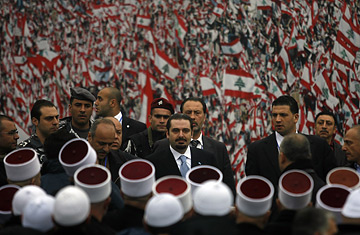
Watched by Druze religious sheiks, majority leader Saad Hariri arrives in down town Beiruts Martyr Square.
Valentine's Day commemoration rallies for two murdered Lebanese — one an extrovert billionaire prime minister; the other a shadowy Shi'ite militant named as one of the world's most wanted terrorists — neatly underlined the chasm dividing Lebanon today.
In the southern suburbs of Beirut, Hizballah chieftain Sheikh Hassan Nasrallah told thousands of mourners at a funeral for his military commander, Imad Mughniyah, that he was ready for an "open war" with Israel, which he blamed for the bombing that killed Mughniyah in Lebanon late Tuesday. Nasrallah also vowed that the United States would never gain influence in Lebanon. Across town, in a central Beirut square, leaders of the U.S.-backed anti-Syrian March 14 coalition issued attacks on Syria, Hizballahs ally, for meddling in Lebanese affairs, and demanded that Nasrallah's party stop blocking the election of a new president.
The only thing shared by the rival crowds were the sheets of icy rain that soaked friend and foe of both Syria and the U.S. Hundreds of Lebanese troops had been deployed in the morning at key intersections throughout Beirut, and main roads were closed off as tens of thousands of March 14 supporters converged on Martyrs Square in downtown Beirut. They were there to honor Rafik Hariri, the former prime minister killed in a bomb blast in 2005, as well as to demonstrate defiance against the opposition, whom they accuse of stoking a political crisis.
Saad Hariri, the former premiers son and political heir, unveiled a monument to his slain father, and then addressed the crowd from behind a bullet proof glass screen. Calling for dialogue and cooperation between rival factions, Hariri said, "This is the goal of the citizens gathered here in Martyrs Square as well as the southern suburbs for the funeral service of resistance commander [Imad Mughniyah]."
A couple of hours later and a few miles to the south, Mughniyahs funeral had all the trappings of a state affair: military salutes, brass bands and even a letter of condolence from Iranian President Mahmoud Ahmadinejad, read out by Irans visiting foreign minister Manouchehr Mottaki. Mottakis presence at the funeral illustrated the high esteem in which Mughniyah had been held in Tehran.
But, as usual, it was Nasrallah who captivated the thousands of black-clad mourners packing the vast auditorium in southern Beirut. Speaking live on a television screen, the Hizballah leader said that in killing Mughniyah, the Israelis had "committed a very big stupidity".
"They killed Imad Mughniyah and they thought the resistance will collapse," he said. "But they are wrong and deluded. Hajj Imads blood will mark the beginning of the downfall of the state of Israel." And then, stating that Israel killed Mughniyah outside the "natural field of battle," meaning beyond Lebanon's borders, Nasrallah warned, "If you want this type of war, let the whole world hear: Let it be an open war".
The Israeli military was reported to have reinforced its positions along Israels northern border with Lebanon, and Israeli embassies around the world are on heightened alert. But the Israelis will not be alone in uneasily pondering Hizballahs reaction to Mughniyahs death. With Lebanon still recovering from the devastating summer 2006 war between Hizballah and Israel, Nasrallahs words are certain to cast a deep sense of apprehension over the government in Beirut and its supporters in March 14.
